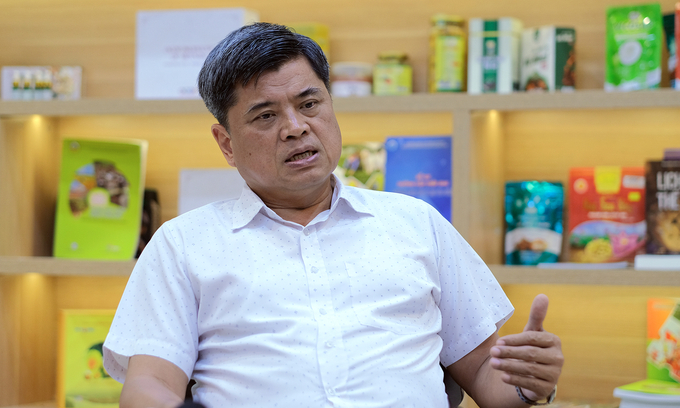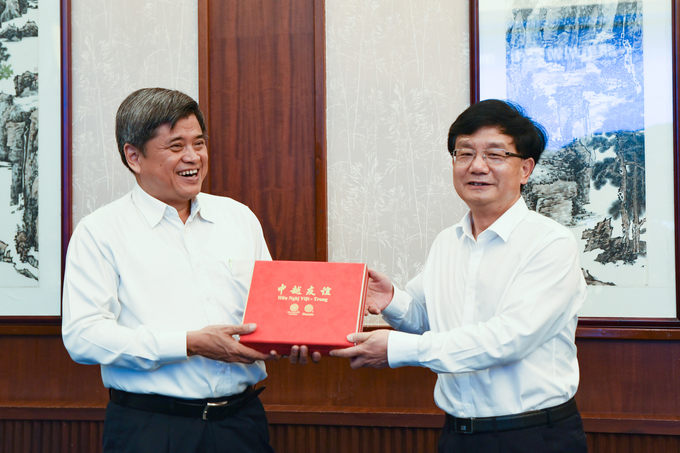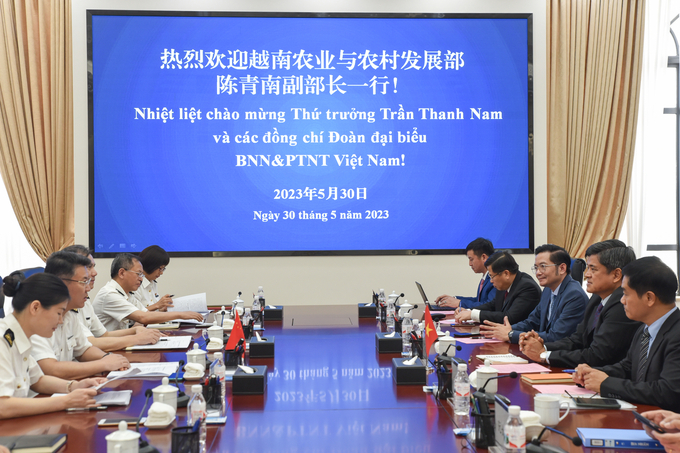November 26, 2025 | 09:08 GMT +7
November 26, 2025 | 09:08 GMT +7
Hotline: 0913.378.918
November 26, 2025 | 09:08 GMT +7
Hotline: 0913.378.918

Deputy Minister Tran Thanh Nam believes that by dominating the Chinese market, Vietnamese agricultural products can reach more demanding countries.
Can you please share the results of the meeting between the Ministry of Agriculture and Rural Development and the governments of Guangxi and Yunnan provinces?
At the meeting with the leaders of Guangxi and Yunnan provinces, both parties engaged in transparent and successful discussions.
Firstly, Vietnam and China agreed to establish a framework for customs and quarantine units from both sides of the border gate to regularly exchange information and expedite the customs clearance process. Furthermore, fresh in-season agricultural products will be prioritized in order to reduce congestion and promote trade in agriculture, forestry and fishery through Guangxi and Yunnan provinces.
Secondly, Vietnam and China agreed to alternately organize annual border trade promotion fairs in corresponding provinces, in order to create opportunities for business meetings and trade between the two countries.
Thirdly, the policy of establishing two agricultural business associations between Vietnam - Guangxi and Vietnam - Yunnan has been approved.
Fourthly, Vietnam and China urged relevant focal points expedite the signing of a Memorandum of Understanding on agricultural cooperation between the Ministry of Agriculture and Rural Development and the governments of Guangxi and Yunnan provinces. The signing ceremony is expected to take place in September 2023 during the China-ASEAN Expo.
The Memorandum covers various topics, including: Information sharing; Collaboration in science, technology and human resource training in agriculture; a coordination framework between the governments of both countries to resolve issues for businesses.
On the other hand, the Ministry of Agriculture and Rural Development contacted the Departments of Customs of the two provinces and discussed four main groups of issues.
Firstly, several solutions have been proposed to increase customs clearance capacity, including: increasing the number of priority enterprises; establishing a one-stop import-export partnership; implementing a framework for exchanging quarantine samples and mutual acknowledgement; conducting research to put the smart border gate system into pilot operation.
Secondly, a contact point is designated to coordinate in the removal of barriers in the trade of agricultural, forestry and fishery products.
Thirdly, an annual meeting will be held alternately between the Departments of Customs in Guangxi and Yunnan provinces and the Government of Vietnam in November every year. The meeting will be an opportunity to conduct yearly review and evaluation as well as provide orientations for the following year.
Fourth, Vietnam has proposed the General Administration of Customs of China to expand the list of agricultural products permitted for export. Several Vietnamese businesses have requested China to approve their exports of agricultural and aquacultural products. Furthermore, Vietnam has asked the General Administration of Customs of China to permit the export of live Vietnamese seafood through the border gates in Yunnan province.

Deputy Minister Tran Thanh Nam and Vice Chairman of Yunnan province Duong Ban exchanging souvenirs at the meeting. Photo: Cao Tran.
Vietnam's agricultural sector have made steady steps on in its journey to conquer the Chinese market. What challenges and disadvantages do you think we have to focus on?
Infrastructure at the border gate areas are currently overloaded to meet trade needs. Many valuable and in-season fresh agricultural products, specifically durian, are often congested at the border gates.
China has constantly updated its policy on importing agricultural products and food over the past few years. Most notably, some quality requirements for imported agricultural products are considered to be on par, or even stricter than those in markets with a reputation for being fastidious such as the United States, the EU, and Japan. These requirements often include licensing and registration, testing and quarantine procedures among many others.
Vietnamese businesses currently lack sustainability in agricultural trade due to a lack of linkages, small-scale trade habits, etc. Additionally, trade promotion activities in the country are relatively limited. Many high-value, high-demand Vietnamese goods have not been allowed to enter the Chinese market.
Guangxi and Yunnan provinces have acknowledged the potential and quality of Vietnamese agricultural products. They are committed to continue deploying trade promotion activities for agricultural products from both countries.
China's economy has shown signs of remarkable recovery after the pandemic. China's GDP in the first quarter increased by 4.5% compared to that of the same period in 2022. Vietnam must take advantage of this opportunity, in combination with the geographical proximity and shared border, to increase the transport of agricultural products on road. Vietnam should aim to meet the immediate needs of 100 million people in the two provinces of Guangxi, Yunnan, and gradually extend to inland Chinese provinces.
The Chinese market is currently interested in aquatic products in addition to agricultural products, . As a result, the Ministry of Agriculture and Rural Development has directed the Department of Plant Protection, the Department of Processing Quality and Market Development to remove local congestion in the border gate area. The long-term solution is to modernize border gate infrastructure in order to create smart border gates that utilize digital technologies. For example, the responsible company and management agencies must prepare customs clearance procedures when the transportation vehicle arrives within 70 kilometers of the border gate to facilitate traceability during the customs clearance process.

The meeting between the Ministry of Agriculture and Rural Development of Vietnam and Nanning's Department of Customs in Guangxi province. Photo: Cao Tran.
What suggestions do you have for Vietnam's exporting businesses looking to develop sustainably?
Both parties are actively studying the prospect of an agricultural business association between Vietnam, Guangxi and Yunnan. This initiative will help protect the rights and interests of businesses as well as giving them speedy access to accurate information.
Moreover, Vietnam has to create conditions for businesses from both countries to learn about each other. Several Chinese businesses have proposed to cooperate with the Ministry of Agriculture and Rural Development.
The governments of Vietnam's border provinces such as Lao Cai, Ha Giang, Lai Chau have regularly kept in touch with the Chinese government. At the central level, the Ministry of Agriculture and Rural Development is implementing multiple sustainable production programs, with a focus on building raw material areas to support exporting businesses.
"These meetings have helped me realize that credibility is extremely important in the Chinese agricultural market. Therefore, I want to recommend agricultural businesses across the country to maintain compliance with Chinese market regulations, instead of considering this as an easy target. Conquering the Chinese market will help Vietnamese businesses extend their reach to other difficult markets. We must establish the habit of building sustainable trade relations based on credibility, in combination with management of the supply chain. These are the keys to bringing Vietnamese bring goods into the global supply chain", emphasized Deputy Minister Tran Thanh Nam.
Translated by Nguyen Hai Long
/2025/11/24/3536-2-112800_176.jpg)
(VAN) Dong Nai now has tens of thousands of hectares of forests certified for sustainable management, and this area will continue to be expanded in the coming period.

(VAN) Vinh Ha hamlet (Dai Xuyen commune, Hanoi) is shifting away from small-scale farming as households adopt bioscurity into their breeder chicken models.

(VAN) Heavy rains make aquatic species more vulnerable to disease. Proactive water management and high-tech systems help farmers prevent outbreaks and protect yields.

(VAN) Greenhouses are shifting production mindsets in Binh Lu commune, enabling farmers to ‘weather the sun and rain’ and secure stable vegetable harvests throughout the year.

(VAN) Green transition is crucial for the Mekong Delta amid climate change and stricter standards, offering a path toward sustainability.

(VAN) Dong Thap promotes agricultural restructuring, forms large specialized farming zones, raises the value of agricultural products and develops toward ecological and high-tech directions.
/2025/11/22/4018-4-213342_747.jpg)
(VAN) The Mekong Delta Agricultural Experts Club has attracted 143 experts and researchers to participate in providing consultancy and contributing initiatives to the development of one million hectares of high-quality rice.